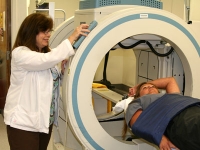Dr. Joyce Starr interviews nuclear technologist Kathleen H. Murphy, MS, CNMT, NCT, RTN, FSNMTS.
Kathleen Murphy began her career as staff technologist in the Nuclear Cardiology Department at Yale-New Haven Hospital. She remained at Yale for 11 years, working in a variety of positions: research technologist, assistant chief technologist, clinical coordinator, and finally program director. In 1996 the program director position was moved to Gateway Community College and she moved with the position. Kathleen is currently Faculty Coordinator of Distance Learning at Gateway CC, and she also teaches two business courses per semester.
Show Date: March 25, 2010
Interview Highlights:

Nuclear Scanner
- The nuclear technology arena is dominated by women. With pay scales running over $30 per hour, the field provides economic security in uncertain times.
- Competition is stiff – requiring strong scientific and mathematical skills.
- Most people confuse nuclear medicine with nuclear power. Nuclear medicine is not only safe – closely regulated by the Nuclear Regulatory Commission – but can be life-saving. PET scans detect and merge both functional and anatomical data.
- Unfortunately, nuclear medicine scans can be relatively expensive as compared to some other diagnostic tests and reimbursement for doctors are low. Therefore, your doctor may be reluctant to prescribe a PET scan (versus a CAT scan, for example). Kathleen Murphy explains why it’s vital that you understand your nuclear technology options.
- Gateway Community College Connecticut offers entry-level training in nuclear medicine technology. Kathleen provides program contact information during the show.
More from Kathleen Murphy:
I have been a nuclear medicine technologist since 1985. After researching a variety of medical careers I decided to pursue nuclear medicine technology because it combined my interests in patient care, anatomy and physiology, and computer technology. I was also excited about the continuous learning that I would have to engage in due to the rapidly changing technology, radio-pharmaceuticals, and procedures. I can honestly say that I’ve never been bored!
I received an Associates of Science degree from Gateway Community College in New Haven, and I immediately transferred to the University of New Haven for the completion a BS degree in Health Administration. I worked full-time at Yale-new Haven Hospital as a nuclear medicine technologist, and I took courses part-time in the evening towards my BS degree. Yale paid 85% of my tuition! I graduated from UNH in 1995, entered the graduate program at UNH and completed a Masters of Science degree in Health Administration in 1998.
What do all those initials after my name stand for? I earned the credentials CNMT (certified nuclear medicine technologist) and NCT (nuclear cardiology technologist) by passing exams offered by a national certifying organization known as the Nuclear Medicine Technology Certification Board (NMTCB, www.nmtcb.org). I served on the Board of Directors of the NMTCB for 8 years, and was the Chairman of the Board in 2003-2004. I also passed the nuclear medicine exam offered by the American Registry of Radiologic Technologists (ARRT, www.arrt.org), so I am a registered technologist in nuclear medicine (RTN).
Finally, in June of 2004 I was inducted as a Fellow in the Society of Nuclear Medicine Technologist Section (FSNMTS). This is an honor that is bestowed to individuals who have served the profession of nuclear medicine technology at the national, local and regional levels. The Society of Nuclear Medicine is the professional organization for nuclear medicine (www.snm.org ).
I highly recommend the career of nuclear medicine technology to anyone who wants to make a difference in a patient’s day by providing high quality care. I thoroughly enjoyed providing physicians with the information they needed to make accurate diagnoses that may have ultimately changed the course of a patient’s treatment plan and affected their quality of life. You can find more information about accredited nuclear medicine technology programs in your area on the Joint Review Committee on Educational Programs in Nuclear Medicine Technology’s web site: www.jrcnmt.org.